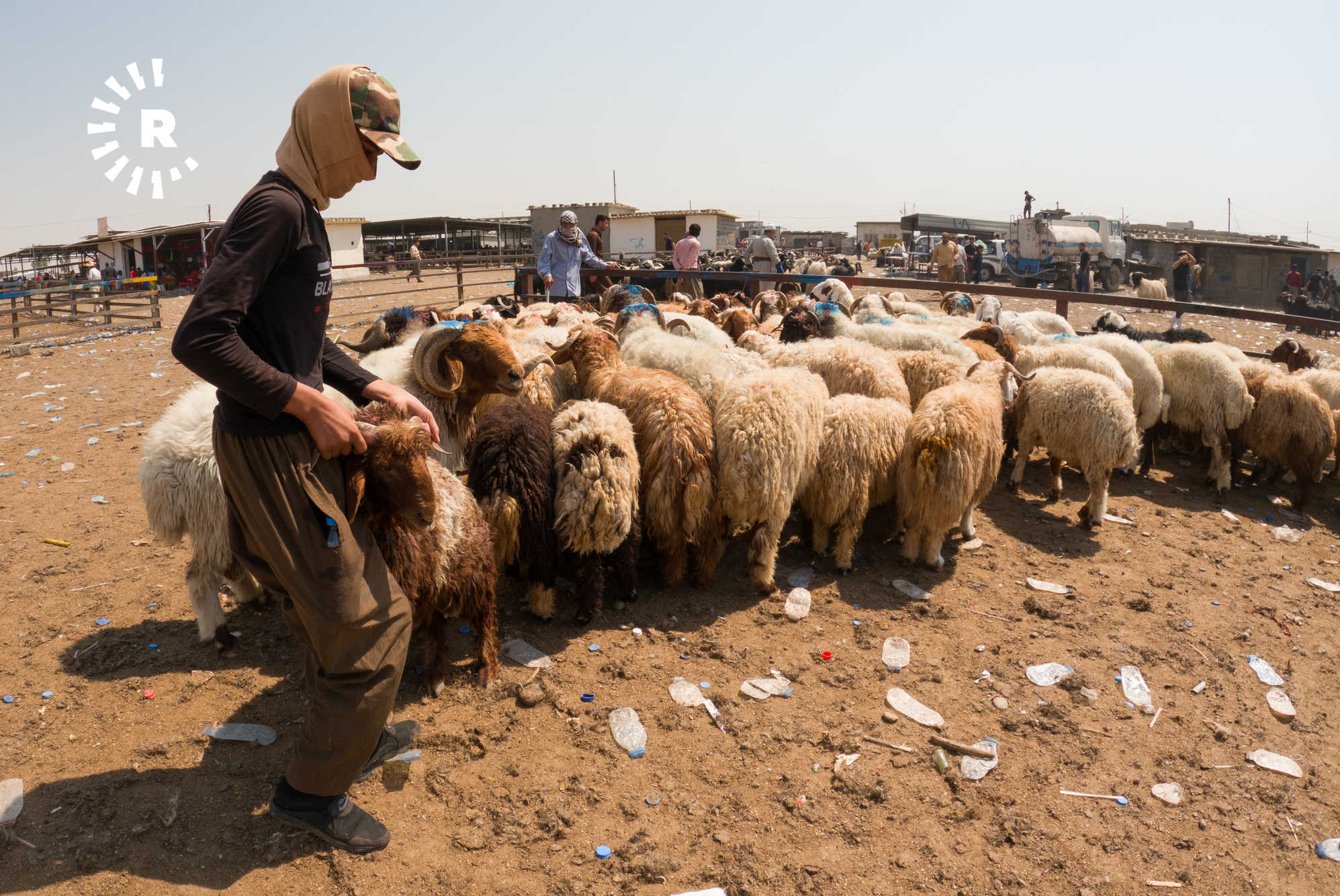16 Photos
Photo Gallery
Tuesday is the first day of the Muslim festival of Eid al-Adha in which people sacrifice animals to commemorate Prophet Abraham’s test of faith when God asked him to sacrifice his only son. As Abraham was about to do so, God stopped him and gave him a lamb instead.
The head of Erbil’s slaughterhouse, Halmat Hamza, said more than 420 animals were killed in just two hours on Tuesday morning and another more than 600 animals are ready.
“Compared to previous years, no year has been like this one, despite the high prices,” said Hamza. Prices are higher because of several factors including devaluation of the dinar and animal feed is more costly due to drought conditions.
Hamza attributes the higher numbers of sacrifices to the fact there is no coronavirus lockdown during the holiday, as well as people not making the Hajj pilgrimage to Mecca. Because of the COVID-19 pandemic, this year just 60,000 fully vaccinated people who are residents of Saudi Arabia are allowed to take part in the pilgrimage, far fewer than the normal crowds of up to 2.5 million.
In the Kurdistan Region, people traditionally slaughter animals in their own houses, often hiring a butcher and making donations of meat to the poor. However, the government banned the practice this year, saying all slaughtering must be done in the slaughterhouses.
Eid al-Adha began on Tuesday, the 20th of July, and lasts four days. Every year, leading up to the holiday, more than 2,000 animals are sacrificed daily across the Kurdistan Region, Firas Siddiq, director of animal resources in the Ministry of Agriculture of the Kurdistan Regional Government told Rudaw English on Tuesday.
Additional reporting by Mohammed Sheikh Fatih, Bilind T. Abdullah
Photos: Animals for sale at Erbil’s livestock market on July 19, 2021. Bilind T. Abdullah/Rudaw
The head of Erbil’s slaughterhouse, Halmat Hamza, said more than 420 animals were killed in just two hours on Tuesday morning and another more than 600 animals are ready.
“Compared to previous years, no year has been like this one, despite the high prices,” said Hamza. Prices are higher because of several factors including devaluation of the dinar and animal feed is more costly due to drought conditions.
Hamza attributes the higher numbers of sacrifices to the fact there is no coronavirus lockdown during the holiday, as well as people not making the Hajj pilgrimage to Mecca. Because of the COVID-19 pandemic, this year just 60,000 fully vaccinated people who are residents of Saudi Arabia are allowed to take part in the pilgrimage, far fewer than the normal crowds of up to 2.5 million.
In the Kurdistan Region, people traditionally slaughter animals in their own houses, often hiring a butcher and making donations of meat to the poor. However, the government banned the practice this year, saying all slaughtering must be done in the slaughterhouses.
Eid al-Adha began on Tuesday, the 20th of July, and lasts four days. Every year, leading up to the holiday, more than 2,000 animals are sacrificed daily across the Kurdistan Region, Firas Siddiq, director of animal resources in the Ministry of Agriculture of the Kurdistan Regional Government told Rudaw English on Tuesday.
Additional reporting by Mohammed Sheikh Fatih, Bilind T. Abdullah
Photos: Animals for sale at Erbil’s livestock market on July 19, 2021. Bilind T. Abdullah/Rudaw
19-07-2021 2
19-07-2021 3
19-07-2021 4
19-07-2021 5
19-07-2021 7
19-07-2021 8
19-07-2021 9
19-07-2021 10
19-07-2021 12
19-07-2021 13
19-07-2021 14
19-07-2021 16
19-07-2021 17
19-07-2021 18
19-07-2021 20
19-07-2021 21
.jpg)
Thousands of animals sacrificed for Eid al-Adha
.jpg)
Thousands of animals sacrificed for Eid al-Adha
.jpg)
Thousands of animals sacrificed for Eid al-Adha

Thousands of animals sacrificed for Eid al-Adha
.jpg)
Thousands of animals sacrificed for Eid al-Adha
.jpg)
Thousands of animals sacrificed for Eid al-Adha
.jpg)
Thousands of animals sacrificed for Eid al-Adha
.jpg)
Thousands of animals sacrificed for Eid al-Adha
.jpg)
Thousands of animals sacrificed for Eid al-Adha
.jpg)
Thousands of animals sacrificed for Eid al-Adha
.jpg)
Thousands of animals sacrificed for Eid al-Adha
.jpg)
Thousands of animals sacrificed for Eid al-Adha
.jpg)
Thousands of animals sacrificed for Eid al-Adha
.jpg)
Thousands of animals sacrificed for Eid al-Adha
.jpg)
Thousands of animals sacrificed for Eid al-Adha
.jpg)


.jpg?scale=both&w=1140&h=750&bgcolor=2a2f33)
.jpg?scale=both&w=1140&h=750&bgcolor=2a2f33)
.jpg?scale=both&w=1140&h=750&bgcolor=2a2f33)

.jpg?scale=both&w=1140&h=750&bgcolor=2a2f33)
.jpg?scale=both&w=1140&h=750&bgcolor=2a2f33)
.jpg?scale=both&w=1140&h=750&bgcolor=2a2f33)
.jpg?scale=both&w=1140&h=750&bgcolor=2a2f33)
.jpg?scale=both&w=1140&h=750&bgcolor=2a2f33)
.jpg?scale=both&w=1140&h=750&bgcolor=2a2f33)
.jpg?scale=both&w=1140&h=750&bgcolor=2a2f33)
.jpg?scale=both&w=1140&h=750&bgcolor=2a2f33)
.jpg?scale=both&w=1140&h=750&bgcolor=2a2f33)
.jpg?scale=both&w=1140&h=750&bgcolor=2a2f33)
.jpg?scale=both&w=1140&h=750&bgcolor=2a2f33)
.jpg?scale=both&w=1140&h=750&bgcolor=2a2f33)